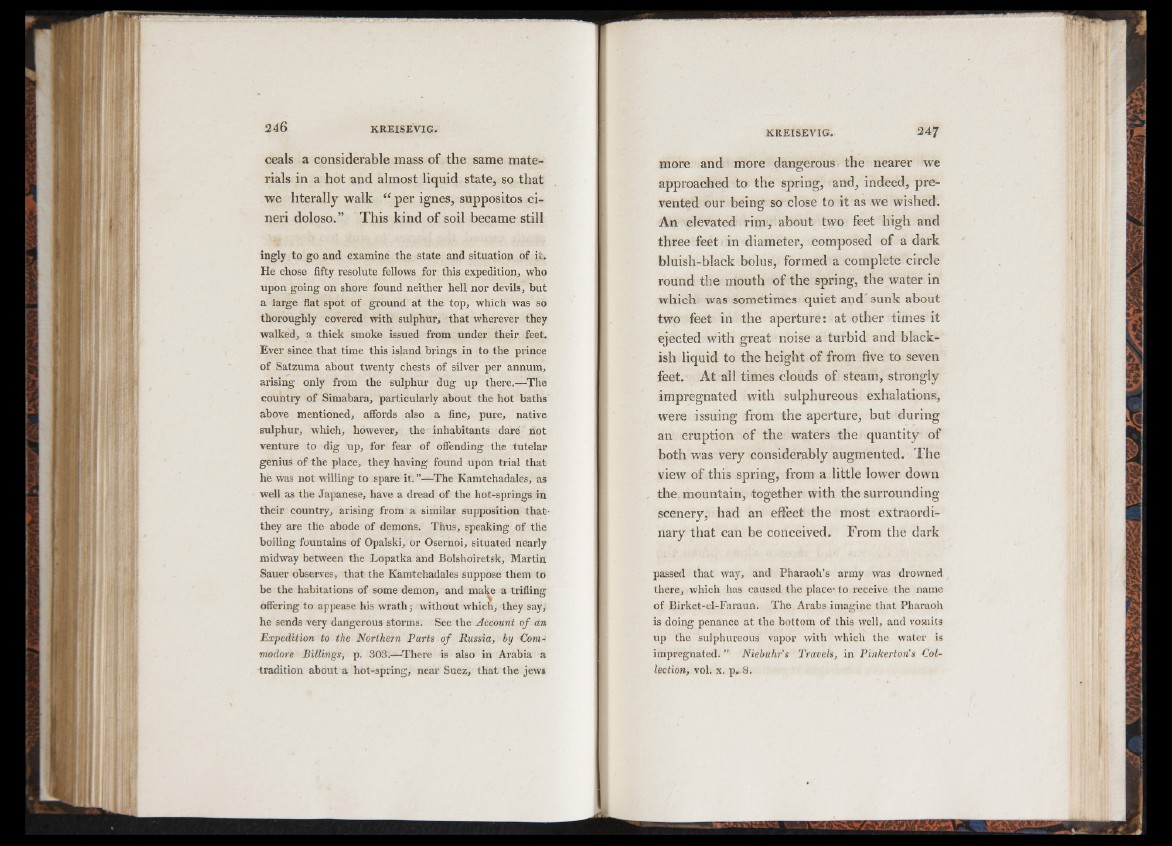
ceals a considerable mass of the same materials
in a hot and almost liquid state, so that
we literally walk “ per ignes, suppositos ci-
neri doloso.” This kind of soil became still
ingly to go and examine the state and situation of it.
He chose fifty resolute fellows for this expedition, who
upon going on shore found neither hell nor devilsj but
a large flat spot of ground at the top* which was so
thoroughly covered with sulphur, that wherever they
walked, a thick smoke issued from under their feet.
Ever since that time this island brings in to the prince
o f Satzuma ahout twenty chests of silver per annum,
arising only from the sulphur dug up there.—The
country of Simabara, particularly about the hot baths
above mentioned, affords also a fine, pure, native
sulphur, which, however, the inhabitants dare not
venture to dig up, for fear of offending the tutelar
genius of the place, they having found upon trial that
he was not willing to spare it. ”—The Kamtchadales, as
well as the Japanese, have a dread of the hot-springs in
their country, arising from a similar supposition that-
they are the abode of demons. Thus, speaking of the
boiling fountains of Opalski, or Osernoi, situated nearly
midway between the Lopatka and Bolshoiretsk, Martin
Sauer observes, that the Kamtchadales suppose them to
be the habitations of some demon, and make a trifling
offering to appease his wrath; without which, they say,
he sends very dangerous storms. See the Account of an
Expedition to the Northern Parts of Russia, by Com-
modore Billings, p. 303.—There is also in Arabia a
tradition about a hot-spring, near Suez, that the jew*
more and more dangerous the nearer we
approached to the spring, and, indeed, prevented
our being so close to it as we wished.
An elevated rim, about two feet high and
three feet in diameter, composed of a dark
bluish-black bolus, formed a complete circle
round the mouth of the spring, the water in
which was sometimes quiet and' sunk about
two feet in the aperture: at other times it
ejected with great noise a turbid and blackish
liquid to the height of from five to seven
feet. At all times clouds of steam, strongly
impregnated with sulphureous exhalations,
were issuing from the aperture, but during
an eruption of the waters the quantity of
both was very considerably augmented. The
view of this spring, from a little lower down
the. mountain, together with the surrounding
scenery, had an effect the most extraordinary
that can be conceived. From the dark
passed that way, and Pharaoh’s army was drowned
there, which has caused the place* to receive the name
of Birket-el-Faraun. The Arabs imagine that Pharaoh
is doing penance at the bottom of this Well, and vomits
up the sulphureous vapor with which the water is
impregnated. ” Niebuhr's Travels, in Pinkerton’s Collection,
vol. x. p.. 8.